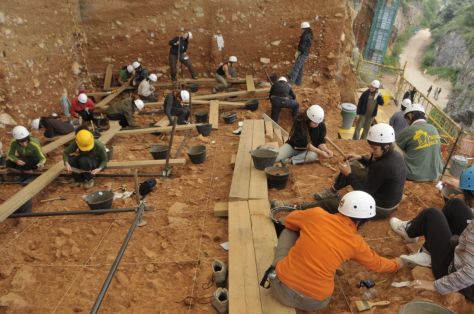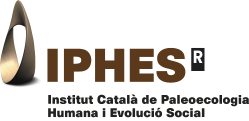NewsNext Previous
The UE renews the Erasmus Mundus Masters in Quaternary and Prehistory that is taught in Universitat Rovira i Virgili at Tarragona
Carlos Lorenzo, professor at URV: “This is a very good news in order to maintain the international commitment in education that is being promoted jointly with the IPHES’s team”
Last September, 9 students defended their final thesis Works ate Ferrara (Italy) and 1 student defended last June in Paris
català – español – photos – facebook
Since the academic year 2004-2005, thanks to the collaboration with the IPHES (Institut Català en Paleoecologia Humana i Evolució Social), the Universitat Rovira i Virgili at Tarragona (URV) offers the Erasmus Mundus Masters in Quaternary Archaeology and Human Evolution. Right now, the European Commission has just announced the agreement to renew it: “That will allow us to enjoy during four more years the guarantee and quality which means to be part of the Erasmus Mundus programme for student recruitment and internationalization of URV”, said Carlos Lorenzo, Coordinator of the master and Head of Education in the IPHES.
This academic offer is carried out jointly with other European institutions: Università degli Studi di Ferrara (Italy), Muséum National d’Histoire Naturelle (Paris, France), Instituto Politécnico de Tomar (Portugal) and Universitat Rovira i Virgili.
Since the time the master’s programme started, every year around fifteen new students join URV, coming from all the regions in the Spanish state and from countries of many areas of the world: Italy, Portugal, Algeria, India, Thai, Morocco, Georgia and Mexico. Teaching staff from other countries such as Argentina, Chile and Mexico has come in order to teach their knowledge. In these years more than 150 master dissertations have been presented, which consist in original research works mandatory to obtain the Erasmus Mundus certificate together with a research mobility abroad in a second international center that possibility to obtain the title Erasmus Mundus.
The research projects currently developed in Eurasia, which the IPHES is actively taking part in, such as Atapuerca in the Spanish state and Dmanisi in Georgia “are some of the appeals for recruiting students, who see the opportunity to work in excavations key for solving very important topics in studying human evolution; like the fact of knowing how the first human dispersals happened, the routes which were used, the species involved an so on”, points out Carlos Lorenzo.

Precisely, the Coordinator of this master and Head of Education in the IPHES highlights: “One of the elements which the EU took into consideration for renewing our master’s programme as well as initially including us as an Erasmus Mundus is that we carry out research of high quality since more than 20 years ago and we develop join projects with our partners which are based on the most important records regarding human evolution”.
The same researcher has pointed out that “all this activity and the fact that the EU renews the academic programme shows our master degree belongs to the international elite, in the framework of the mobility which the Bologna process requires”.
In this way it is expected to consolidate Tarragona as a worldwide reference in studies on human evolution. Indeed, last September nine students from the master’s degree defended their thesis in an academic session at the Università degli Studi di Ferrara, and one student did the same last June in Paris. The topics of analysis have been the anatomy of Neanderthals; 3D study of brain asymmetries and sexual dimorphism in Homo sapiens, Pan troglodytes, Gorilla gorilla and fossils of the genus Homo; the consolidation of fossil bony material, the ictofauna marina processing with flint tools, the tapirs of the Camp dels Ninots (Caldes de Malavella), the funerary practices in the Neolithic, the forestry resources for firefighting, the mechanical cleaning of fossils in the process of conservation and restoration to facilitate its study and new methods to investigate the tafonomy of the deposits of Olduvai (Africa).


